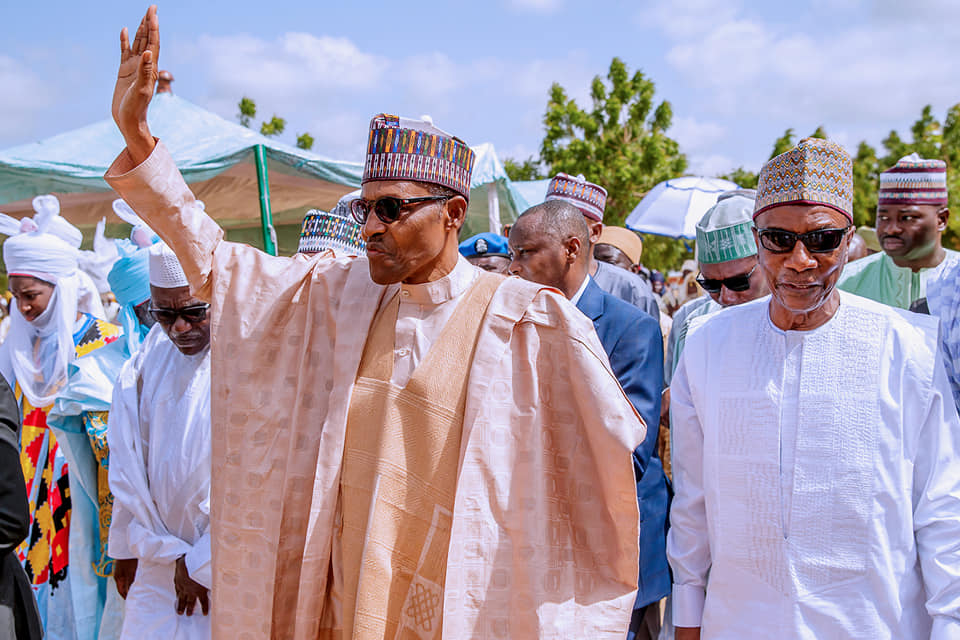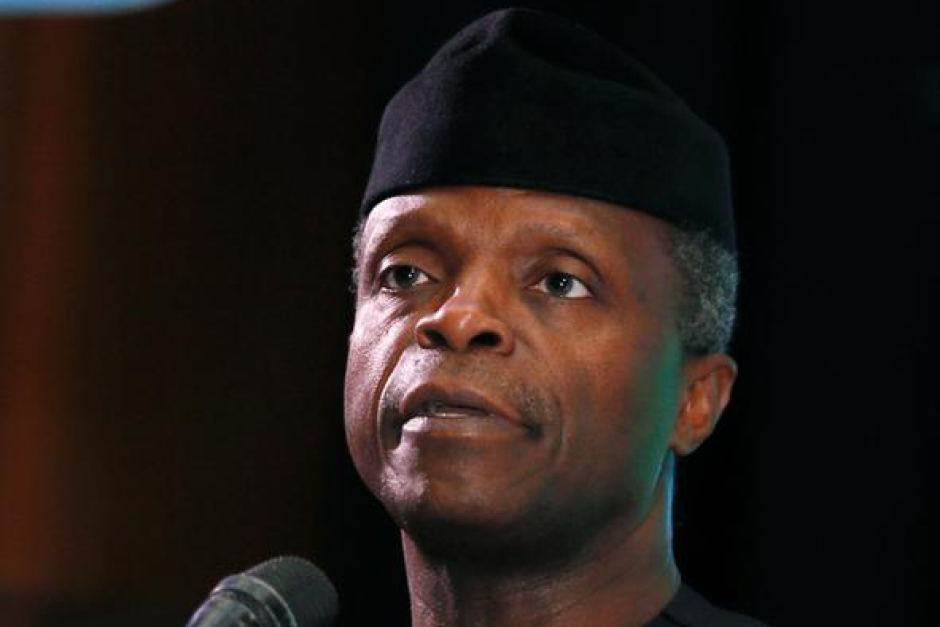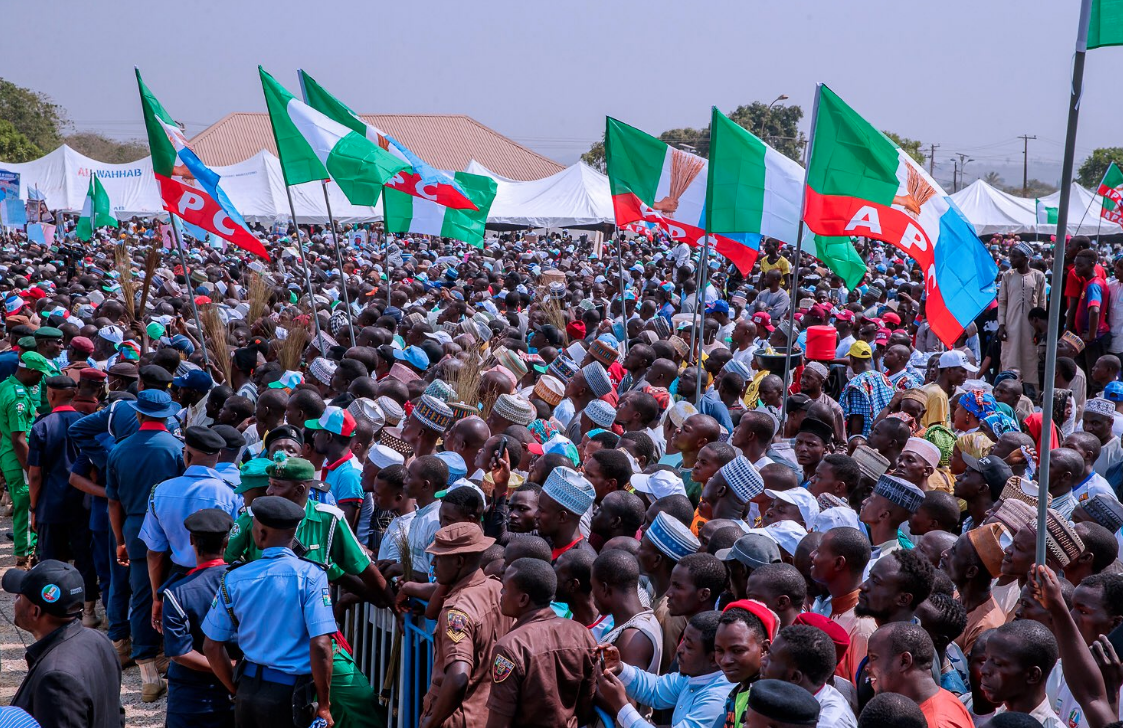Just in case you missed this frightening and scary story. It was one that set the airs on every patriot’s skin on the edge during the upper week. It provoked eerie goose pimples that instantly colonized the pores of their skins. The celebratory mood of the country during the Sallah festivity notwithstanding, that event would have polluted national joy. The First Family was also prepared to join in the celebration. Pronto, words had gone to the Protocol department of the Villa to make ready necessary logistics as President Muhammadu Buhari would be celebrating the Islamic festival with his kith and kin in the ancient city of Daura, Katsina State.
The President promptly emerged from his office to the entrance of the Aso Rock Villa. Fawners of power slipped over one another to raise the traditional clenched fist and arm-propelled-into-a-
As soon as they got to the airport, the president was escorted to the Presidential plane whose engine had been set running on the tarmac. Before boarding, he observed the ancient governmental ritual of shaking hands with top government officials who had lined the route to the entrance of the plane as if they were envoys about to sign the Strategic Arms Limitation Treaty again. Having dispensed with the ritual, the president sat relaxed inside the plane, his wife beside him, as well as one of his daughters who wore this oriental attire that reeked of wealth and splendor. Then the plane took off. Shaky and rather not in possession of the grips of its takeoff, it however managed to stabilize in the sky. And just as President Buhari’s favourite kunu, his usual on trips of this hue, was being wheeled to him, one of the air hostesses, alarm festooning her face, apparently panicky, rushed to him.
“Shugaba, there is a problem!” she stammered. As she spoke, the plane began to make an unusual meandering in the sky. The hostess’ voice also meandered dangerously, just as she managed to waffle out the words: “We just found out that the pilot isn’t Captain Ali Baba-Kura, head of the Presidential fleet… indeed, Shugaba, it was only now that we discovered the pilot now on the cockpit is one Joshua Nas, a man who was sent out of the air school just after two weeks of training… we are in trouble, Your Excellency…”
Advertisement
If you are beginning to think that the above scenario is improbable, unreal and impracticable, belonging only in the amateurish plots of Nigerian Nollywood script writers, just place the list of Nigerian ministers just sworn in last week by same President Buhari, side by side their credentials and their portfolios. You will realize that the scenario, in the world of Buhari and surrogates who run the country on his behalf, or with whom he runs this country, is as real as the pain faced by one whose tooth had just been extracted, who wants to laugh at the same time. Or, at best, a sudden realization that the medic who had just opened one’s tummy up, was a mere head of the nearby butchers’ association. It is the only explanation for the socio-economic self-immolation which the Buhari government had just committed regarding the fates of a Nigerian population said to be in the neighbourhood of 200 million persons.
After a lumbering, interminable spell, Buhari produced a 43-member ministerial list comprising seven women and thirty-six men. Out of the 14 ministers in his first cabinet appointed now, 12 were retained in their previous posts. One of them is Chris Ngige, whose rating in the job had been thoroughly despised by stakeholders. Same for key ministers in the so-called development agenda of the government, education, Adamu Adamu, who has been severally criticized for making passable impact in the ministry in his first appearance, became Buhari’s choice. For instance, the out-of-school children figure, which has been a key index of development, has remained jaundiced under Adamu’s handling. So also the Justice Ministry under the hands of Abubakar Malami. Controversies have dogged the concept of justice under him, provoking the unpleasant epithet of Minister of Injustice. The corruption fight under the supervision of his ministry has remained the comatose patient he inherited, save for the hype of a justice-beholden administration in the media, a pack of which is heading for its canvass.
Buhari’s reappointment of Zainab Ahmed as the Minister of Finance has helped situate the kind of government he wants to run in the next four years. Aftermath the cyclone that swept off erstwhile Minister of Finance, Kemi Adeosun, Ahmed was deployed from her Ministry of State for Budget and National planning to oversee the Finance Ministry. Immediate past Executive Secretary and National Coordinator of the Nigeria Extractive Industries Transparency Initiative (NEITI) and an accountant by profession, her dismal fare since Adeosun’s exit is the subject of wagging tongues of stakeholders. She was said to be laid-back in attending to files, unlike the swiftness with which Adeosun treated same. She is also said to be very lax in pursuing an against-method economic/financial policies for the government. All in all, the prevailing hunger, hardship and hopelessness that have supervened the national landscape should be a mirror of how the Buhari government itself has performed and how far the ministers have lent their understanding to him.
Advertisement
Looking at the list, your mind will immediately chisel out a scenario equivalent to Captain Baba-Kura’s. Nigeria looks like a “company” that had just entrusted her administration, with a humongous budget and staff and multifarious products and services which are expected to jumpstart and impact the life of every Nigerian, into the hands of an amateurish cast of barely well-meaning political loyalists. They possess sparse understanding of what their new offices needed but are ostensibly smart and committed to the All Progressives Congress (APC). They may be workaholics at political campaigns that got the President the ticket to the Villa but ultimately, they can be compared to the incongruence and the misnomer of a barely qualified pilot driving the presidential plane – apology to the Chief Justice of Nigeria.
Though a cacophony of disappointing reactions had circulated round the airspace immediately the ministerial list came out, one of the ministers put the incongruity in very sharp perspective. He is Minister of Interior, Rauf Aregbesola, former governor of Osun State and ex-Commissioner for Works in Lagos State. Never known to have short supply of whimsical riposte to situations as this, he had shot out: “I don’t really know much about the operations or policies of the ministry apart from stories about (it) on the pages of newspapers. My relationship with the ministry is distant. What I know about (it) is what I read in the newspapers,” he had said.
As if there is a dearth of quality personnel who can man the ministries, aside one or two persons, Buhari, in the two cabinets he has had, has shown a morbid fascination with those who have very high political relevance, rather than those imbued with performance pedigree, ability and professionalism. There is also a fixation he has for recompense. He was quoted to have told the people of Kaduna and Kano states that he gave them two ministerial portfolios to compensate them for stacking heavy votes in his favour. This is at best very self-serving and absurd in a democracy. A combination of all these, no doubt, has had very damming and deleterious effect on the so-called #NextLevel mantra of the government. Goodluck Jonathan, Olusegun Obasanjo and Umaru Yar’Adua had quality professionals as ministers who gave form and content to their governments. You had persons like Olusegun Aganga, Ngozi Okonjo-Iweala, Akinwunmi Adesina, who after leaving ministerial offices, soared higher in international estimation. The bulk of Buhari’s ministers have been those whose political credentials are obese but are very lean in prosecuting any development agenda.
Why appoint as ministers those who are coming into contact with the concept of their ministries for the first time, who will spend the next four years as crèche pupils of their ministerial portfolios? With Aregbesola’s stint in the Ministry of Works and governorship of Osun State, why not affix him in, say the Ministry of Works? With the globally touted retarded growth of Nigeria in the power sector, why not appoint a capable technocrat as minister? I learnt that the man Buhari appointed Minister of Power, Saleh Mamman, was an Assistant Director (Technical) in the Taraba State Government. I pray this is not true. What that mean is that the minister would spend the next four years trying to understand the ministry. Oh, my God, a Technician in the ministry? This must be a lie! What calamity can befall a people that is more than that this?
Advertisement
It was bad enough that the fixation of governments in time past was on credentials but Buhari’s is on the politics of their credentials. He is fixated on political pedigree as passport to membership of his cabinet. Which is very retrogressive. When he said he would appoint those he knew personally, those who are apprised with his lumbering, hermitic knowledge of the other person reckoned that the cabinet would be made up of characters locatable only in his restricted circle of influence. There are several technocrats who possess the midas-touch to rescue Nigeria from her stasis. Aside his mouthing it, Buhari has no economic agenda to lift Nigeria out of the economic woods and open up the economy. If he had, it is buried deep down in an abomasum created only for him. The Nigerian economy had contracted under him by 43 per cent last year and there is very sparse Foreign Direct Investment into the economy due to the upsurge in violence and insecurity in the land. The oil sector, still the driving force of the economy, is in turn driving by the sharks and whales of corruption.
A serious government desirous of pulling its country from an economic morass like ours cannot sustain these Acheulian ministerial characters on parade. An ideal one would have its bureaucracies policed by ministers who possess a combination of sterling qualities, talents and skills. Other qualities should be technical expertise, organizational know-how and decades of unimpeachable on-the-job experience. We will also need ones with unassailable pedigree of management and skills, maturity steeped in wisdom, forthrightness and willingness to subjugate an innate tendency for subordinating private ambitions for societal greater good. Juxtapose all I have said against the personality of Rotimi Amaechi for instance, and others in Buhari’s archival cabinet in general, and a sense of where we are and where we will likely be in the next four years will hit you like a tornado.
May the Alale Ile yi support Akintoye
Advertisement
I have written severally about how the Yoruba nation is today suffering a neglect of immense proportion. Worsened by its traditional and historical nature to be Babelian even on matters that will change its lot for the better, outsiders, most especially the Hausa Fulani, have always derided the nation. You will need to hear what Chief Obafemi Awolowo said of the race. According to him, it was a fractitious group that took pride in fighting one another. Today, that tendency to dissent, has been the bane of its growth. While Yoruba people are still bickering on how to tidy their house, the North is already building blocks for the attainment of a straight third term in office in 2023.
It is against this backcloth that you will appreciate the news of the decision late last week to elect foremost Professor of History, Professor Banji Akintoye as the Leader of the race by the Assembly of All Yoruba Groups Worldwide. Prof Akintoye, was one of those Awolowo trusted enough to send to the Senate in 1983 and was said to have been elected based on his antecedents and contributions to the development of the Yoruba race.
Advertisement
The race has suffered terribly in the hands of those who do not want it to unite. The unity of the Yoruba race is a terrible blow on the hegemonists who rely on its disunity as a cannon-fodder to incinerate the Nigerian state. They always have brilliant and enterprising anvils with which they carry out their agenda. A politician cannot fit the bill. A giant of Akintoye’s hue, who schooled in the Awo School of Politics, is the race’s best bet.
The task for Akintoye is akin to that which Awolowo embarked upon in the 1940s. Having discovered this tendency to self-destruct, he set out to forge a race that is one of the most powerful in history, united by a pedigree of values and valour. Unfortunately, that pedigree has meshed into nothingness. Yoruba are among the greatest fraudsters, traitors and every imaginable vice on parade today. Akintoye will need to return lost confidence of the race in itself and remind it of the imperishable wisdom in the maxim, atelewo eni kii tanni je. Once the Yoruba regain their sense of pride, confronting their attackers with mental strength would be a foregone conclusion. Congratulations to the new Yoruba leader. May the Owners of this Land, (the Alale Ile yi) support you.
Advertisement
Views expressed by contributors are strictly personal and not of TheCable.
Add a comment







